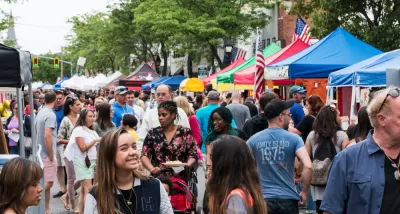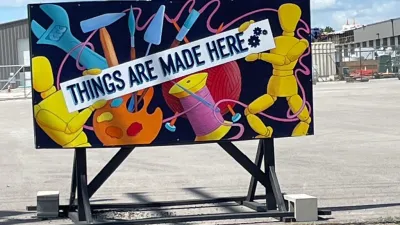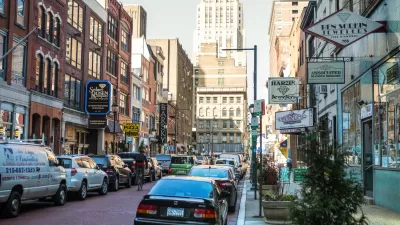Attracting a major employer or a tech company is not the only economic development strategy that deserves attention and investment.

When community leaders in Columbia, Missouri, first set out to revitalize The Loop, the prospects felt daunting. This stretch of Highway 40 serves as the entrance to Columbia but has been neglected for decades. Local small businesses were few, and struggling.
Leaders organized conversations with neighbors to understand what types of businesses were currently in the region, what the community wanted, and how this effort could contribute to broader city priorities. They soon learned that one particular type of business held an uncommonly powerful potential to support transformation.
Small-scale manufacturers like Claysville Creations and Heartland Soapworks were selling products online as well as in retail spaces, creating jobs, and — most crucially — attracting visitors who want to buy products right where they’re made. The project team realized these would be perfect businesses to be among the first to build a destination in The Loop. Because they sell online, they don’t depend on foot traffic, but still create a reason for people to visit and stay awhile.
Small-scale manufacturers produce anything from textiles to hardware to beer or coffee and more. Unlike large manufacturers, they fit into relatively small square footage and are clean, quiet neighbors. They are well-positioned to compete in the digital economy, but also fill storefronts and contribute to a thriving downtown or business district. They create jobs at a variety of skill levels, and it’s often women, immigrants, and Black, Latino or other business owners of color at their helm. Many owners operate these businesses out of their homes or garages at first, so your neighborhood might be home to small-scale manufacturers already.
FULL STORY: An Overlooked Economic Powerhouse for Small Cities

Alabama: Trump Terminates Settlements for Black Communities Harmed By Raw Sewage
Trump deemed the landmark civil rights agreement “illegal DEI and environmental justice policy.”

Study: Maui’s Plan to Convert Vacation Rentals to Long-Term Housing Could Cause Nearly $1 Billion Economic Loss
The plan would reduce visitor accommodation by 25% resulting in 1,900 jobs lost.

Planetizen Federal Action Tracker
A weekly monitor of how Trump’s orders and actions are impacting planners and planning in America.

This Toronto Suburb Has More Bus Riders Than Columbus, Ohio
Brampton, Ontario used gradual improvements in service to prove that if you build it, they will ride.

Paris Bike Boom Leads to Steep Drop in Air Pollution
The French city’s air quality has improved dramatically in the past 20 years, coinciding with a growth in cycling.

Why Housing Costs More to Build in California Than in Texas
Hard costs like labor and materials combined with ‘soft’ costs such as permitting make building in the San Francisco Bay Area almost three times as costly as in Texas cities.
Urban Design for Planners 1: Software Tools
This six-course series explores essential urban design concepts using open source software and equips planners with the tools they need to participate fully in the urban design process.
Planning for Universal Design
Learn the tools for implementing Universal Design in planning regulations.
Smith Gee Studio
Alamo Area Metropolitan Planning Organization
City of Santa Clarita
Institute for Housing and Urban Development Studies (IHS)
City of Grandview
Harvard GSD Executive Education
Toledo-Lucas County Plan Commissions
Salt Lake City
NYU Wagner Graduate School of Public Service





























